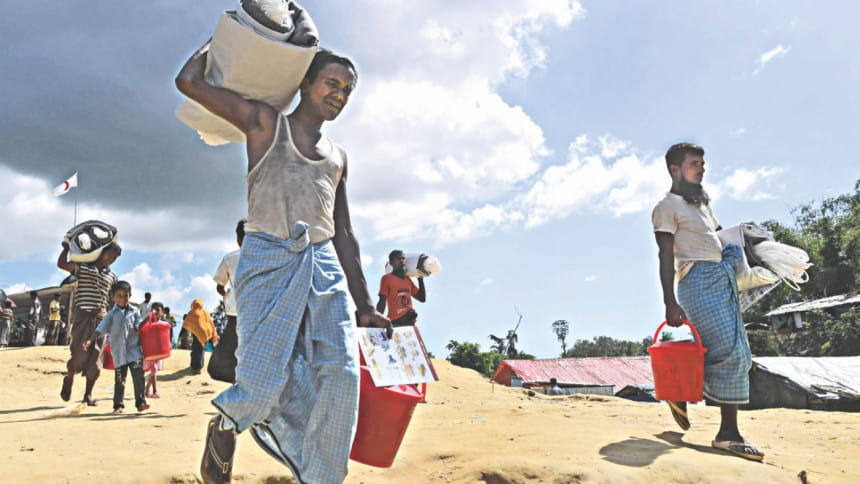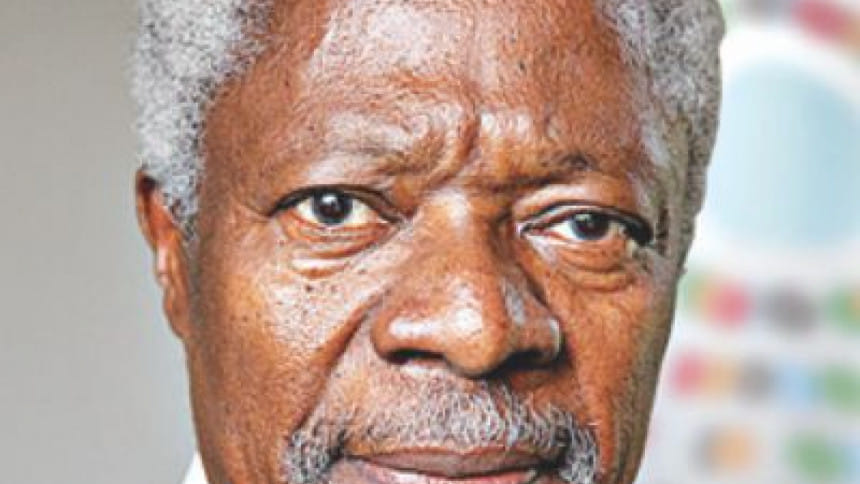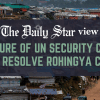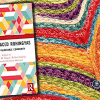Get Rohingyas back home

Former UN chief Kofi Annan urged the Security Council on Friday to push for the return to Myanmar of hundreds of thousands of Rohyingas who have been driven out in an army campaign.
Annan, who leads the Rakhine's Advisory Commission, said world powers must work with the country's military and civilian leaders to end the refugee crisis, reports AFP.
The Security Council is weighing action, possibly a resolution laying out demands, but diplomats have said China, a supporter of Myanmar's former ruling junta, and Russia are opposed to such a measure.
"I hope the resolution that comes out urges the government to really press ahead and create conditions that would allow the refugees to return with dignity and with a sense of security," Annan told reporters after a closed-door meeting with the council at the UN Headquarters in New York.
Representatives from Myanmar and Bangladesh, as well as of civil society, were present at the meeting.
Rohingya crisis would become a "long-term festering problem" unless the international community works together to stabilise the situation based on the Advisory Commission's report on Rakhine State.
"It was clear that everyone agrees on what needs to be done in the short-term: stopping the violence; getting humanitarian aid to those in need, and helping with the dignified and voluntary return for those [refugees] in Bangladesh," Annan said.
This particular point "is not going to be easy," he said, stressing that the refugees would only go back if they had a sense of security and confidence that their lives would be better.
"They should not be returned to camps...they need assistance to get their homes back," Annan said.
Meanwhile, the European Union has said the conditions for the safe, voluntary and dignified return of those who have fled their homeland must be put in place.
"The authorities in Myanmar need to take forward swiftly full implementation of the recommendations of the Advisory Commission, including citizenship for the Rohingya population," said Head of the EU Delegation to the United Nations Ambassador Joao Vale de Almeida in New York.
More than 5,36 lakh Rohingya people have crossed into Bangladesh over the last one and a half months, fleeing a security crackdown that allegedly killed 3,000 and burned 284 villages where majority were from the Muslim minority.
The UN said the brutal attacks on Rohingyas had been well-organised, coordinated and systematic, with the intent to not only drive the population out of Myanmar but also to prevent them from returning to their homes.

The UN termed the crackdown a "textbook example of ethnic cleansing", while rights bodies defined the attacks as crimes against humanity and genocide against the Rohingyas, who have been denied citizenship and other basic services in Rakhine State despite their roots for generations in Myanmar.
Bangladesh Prime Minister Sheikh Hasina raised the issue at the UN General Assembly. In late September, a Security Council meeting failed to take any resolution on Myanmar because of opposition from China and Russia.
Britain, France and the US demanded an end to the violence, while China's ambassador called for patience. Russia's envoy warned that "excessive pressure" could only worsen the problems.
At the request of France and Britain, the Security Council again held a meeting on Friday to hear from Kofi Annan.
Annan told reporters the refugees must be allowed to go back to their villages and helped to rebuild and reconstruct their lives, but the key question of citizenship and verification was "a real problem for the Muslim community."
Annan pointed out that State Counsellor Aung San Suu Kyi had accepted the recommendations of his report and had agreed to set up an implementation committee.
Friday's meeting was "particularly useful and helpful to build consensus" on two goals: supporting the recommendations of Annan's commission and denouncing "the totally unacceptable status quo," said French Ambassador Francois Delattre, who co-chaired the session with British envoy Matthew Rycroft.
Asked whether sanctions or another resolution could ensue, Rycroft said he hoped to "carry on working in a spirit of bringing everyone together.
"And we will explore whether there is the appetite to do more," he added.
The Chinese and Russian UN missions didn't respond to AP requests for comments.
SUU KYI SETS OUT AID PLAN
Aung San Suu Kyi has set out plans for a new humanitarian project to enable Myanmar's Rakhine State to emerge as a peaceful and developed region, which, a close adviser said, showed her determination to fix the country's refugee crisis.
Suu Kyi said in a televised address on Thursday evening that she would invite aid organisations, business leaders and civil society to take part in the initiative aimed at defusing the violence in Rakhine, reports Reuters.
"What she's interested in is how to fix this, how to... give the civilian government, as opposed to the military, the power to deliver aid, reconciliation and rebuilding," said the adviser, who briefed reporters, by telephone, on condition of anonymity.
In her speech, Suu Kyi said that although the government may not be strong, she hoped the strength and generosity of the people would turn the initiative, to be launched on Sunday, into a "milestone" in Myanmar's history.
"She [Suu Kyi] is appalled by what she has seen. She does care deeply about this. I know that does not always come across. But she really does," Suu Kyi's adviser told reporters.
But she had to tread carefully in order not to inflame things further, he said, saying Myanmar's transition to democracy was in a "perilous position".
PLEDGING CONFERENCE ON FUND MOBILISATION
The UN Office of Coordination on Humanitarian Affairs (UNOCHA) in a statement said yesterday UNOCHA, UN refugee and migration agencies in cooperation with European Union and the Kuwait government will hold a ministerial-level pledging conference in Geneva on October 23.
"The conference aims to raise the necessary resources to enable the humanitarian community to meet the most urgent needs of Rohingya refugees who sought shelter and safety in Bangladesh."
Early October, the UN sought US$434 million as emergency aid for the Rohingyas over the next six months.

 For all latest news, follow The Daily Star's Google News channel.
For all latest news, follow The Daily Star's Google News channel. 








Comments